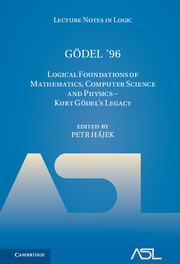Book contents
- Frontmatter
- Contents
- Preface
- Part I Invited Papers
- Gödel's program for new axioms: Why, where, how and what?
- Infinite-valued G?del Logics with 0-1-Projections and Relativizations
- Contributions of K. Gödel to Relativity and Cosmology
- Kurt Gödel and the constructive Mathematics of A.A. Markov
- Hao Wang as Philosopher
- A bottom-up approach to foundations of mathematics
- K-graph Machines: generalizing Turing's machines and arguments
- Forcing on Bounded Arithmetic
- Uniform Interpolation and Layered Bisimulation
- Part II Contributed Papers
- References
Hao Wang as Philosopher
from Part I - Invited Papers
Published online by Cambridge University Press: 23 March 2017
- Frontmatter
- Contents
- Preface
- Part I Invited Papers
- Gödel's program for new axioms: Why, where, how and what?
- Infinite-valued G?del Logics with 0-1-Projections and Relativizations
- Contributions of K. Gödel to Relativity and Cosmology
- Kurt Gödel and the constructive Mathematics of A.A. Markov
- Hao Wang as Philosopher
- A bottom-up approach to foundations of mathematics
- K-graph Machines: generalizing Turing's machines and arguments
- Forcing on Bounded Arithmetic
- Uniform Interpolation and Layered Bisimulation
- Part II Contributed Papers
- References
Summary
In this paper I attempt to convey an idea of Hao Wang's style as a philosopher and to identify some of his contributions to philosophy. Wang was a prolific writer, and the body of text that should be considered in such a task is rather large, even if one separates off his work in mathematical logic, much of which had a philosophical motivation and some of which, such as his work on predicativity, contributed to the philosophy of mathematics. In a short paper one has to be selective. I will concentrate on his book From Mathematics to Philosophy [1974], since he considered it his principal statement, at least in the philosophy of mathematics. It also has the advantage of reflecting his remarkable relationship with Kurt Gödel (which began with correspondence in 1967) while belonging to a project that was well under way when his extended conversations with Gödel took place. Although Gödel's infiuence is visible, and in some places he is documenting Gödel's views by arrangement with their author, the main purpose of the book is to expound Wang's philosophy. Although I will comment on the Wang-Gödel relation, a discussion of Wang's work as source for and interpretation of Gödel, work which included two books written after Gödel's death ([1987] and [199?]) will have to be deferred until another occasion.
Style, convictions, and method
Wang's writings pose difficulties for someone who wishes to sort out his philosophical views and contributions, because there is something in his style that makes them elusive. FMP, like other writings of Wang, devotes a lot of space to’ exposition of relevant logic and sometimes mathematics, and of the work and views of others. Sometimes the purpose of the latter is to set the views in question against some of his own (as with Carnap, 381-384); in other cases the view presented seems to be just an exhibit of a view on problems of the general sort considered (as with Aristotle on logic, 131-142). The presence of expository sections might just make Wang's own philosophizing a little harder to find, but it is not the most serious difficulty his reader faces. That comes from a typical way Wang adopts of discussing a philosophical issue: to raise questions and to mention a number of considerations and views but with a certain distance from all of them.
- Type
- Chapter
- Information
- Gödel '96Logical Foundations of Mathematics, Computer Science and Physics - Kurt Gödel's Legacy, pp. 64 - 80Publisher: Cambridge University PressPrint publication year: 2017

